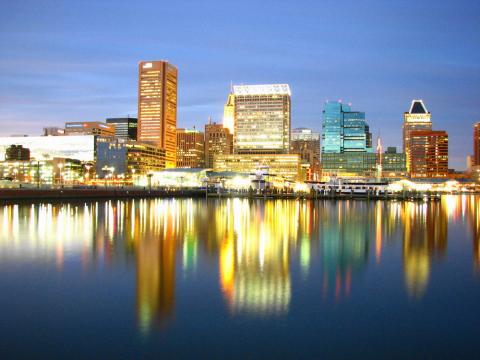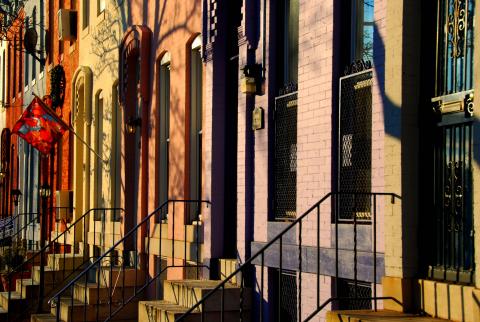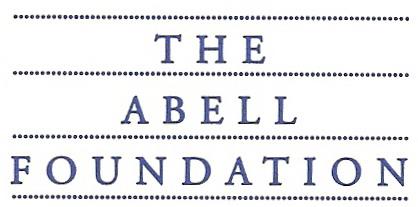Updated September 2016
Founded in 1729, Baltimore quickly grew thanks to its active port and role as a granary for sugar-producing colonies in the Caribbean. Its growth was further fueled by the development of new rail lines in the 19th century which connected Baltimore to markets in the Midwest and established the City as a major shipping and manufacturing center.
After reaching a peak of nearly 950,000 residents in 1950, however, Baltimore’s population began to decline as significant numbers of white residents began moving to the suburbs and manufacturing jobs began leaving the city. Thus, while Baltimore remains the largest city in Maryland and the second largest seaport in the Mid-Atlantic, it is no longer an industrial city dominated by steel processing, shipping, and manufacturing. Instead, the leading employer is now Johns Hopkins, which operates the city's largest university and hospital. In fact, according to the Maryland Department of Commerce, the city’s eight largest employers are either nonprofits or public institutions.
According to U.S. Census Bureau, Baltimore had around 621,849 residents as of July 2015. Nearly two-thirds (63 percent) of these are African American, 28 percent are white American, 5 percent are Hispanic American, and 3 percent Asian American. Poverty is a significant problem, affecting nearly a quarter (23 percent) of the city’s population. Baltimore’s African American residents are disproportionally affected by the city’s social and economic challenges. For example, while the median household income for white American residents was $60,550 in 2013, for African American residents it was just $33,610. Similarly, while well over a third (37 percent) of all African American men aged 20-24 were unemployed in 2013, just 10 percent of white American men in the same age group were jobless.
Working to address these severe disparities and rebuild community wealth are numerous nonprofits, anchor institutions, and other groups. For example, Living Classrooms Foundation runs a social enterprise that revitalizes neighborhoods while providing training opportunities for 150 unemployed and disadvantaged adults each year. To date, its program is credited with cleaning over 40,000 vacant properties, rehabilitating 12 vacant homes, renovating 28 community buildings, and conducting over 45,000 hours of other needed community services. Another leading nonprofit in this field is Humanim, which runs several social enterprises including Details, a deconstruction and repurposing enterprise that has created over 60 jobs for those with barriers to employment.
As the city’s largest employer, Johns Hopkins has also taken an active role in the community. Established in 2000, its Urban Health Institute (UHI) strives to brin gresources to the city and especially East Baltimore (the community in which its medical center is located) to improve community health and wellbeing. More recently, Hopkins launched HopkinsLocal, an initiative to expand participation by local and minority-owned businesses in its construction projects, hire more city residents, and increase procurement from local firms. HopkinsLocal inspired 25 area businesses to initiate a similar effort, BLocal, which also aims to boost locally-based hiring, procurement, and construction contracting. As of 2016, BLocal participants had pledged to direct at least $69 million into locally-owned, minority-owned, women-owned, and disadvantaged businesses over a three-year period.
A review of these and other community wealth building efforts follows:


